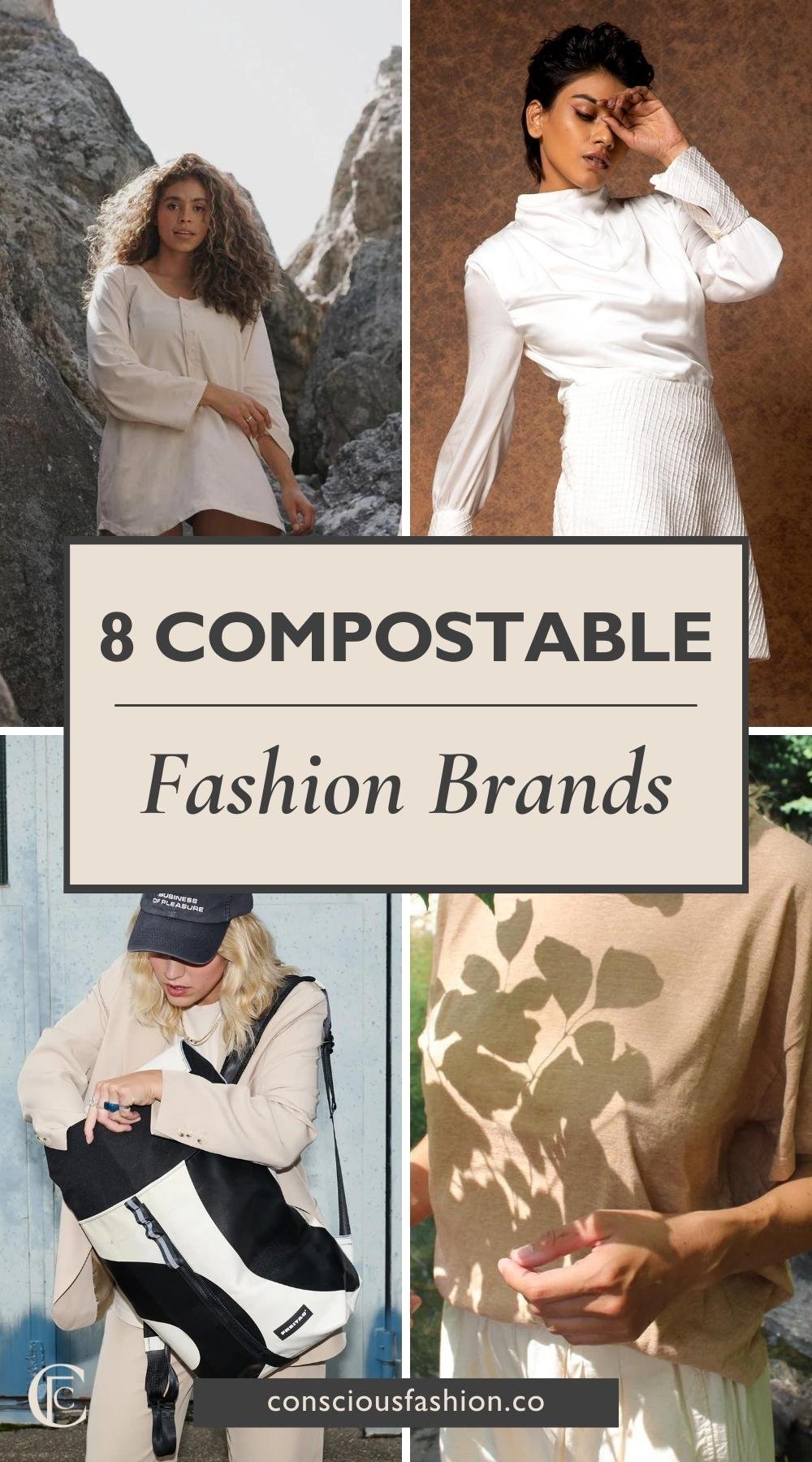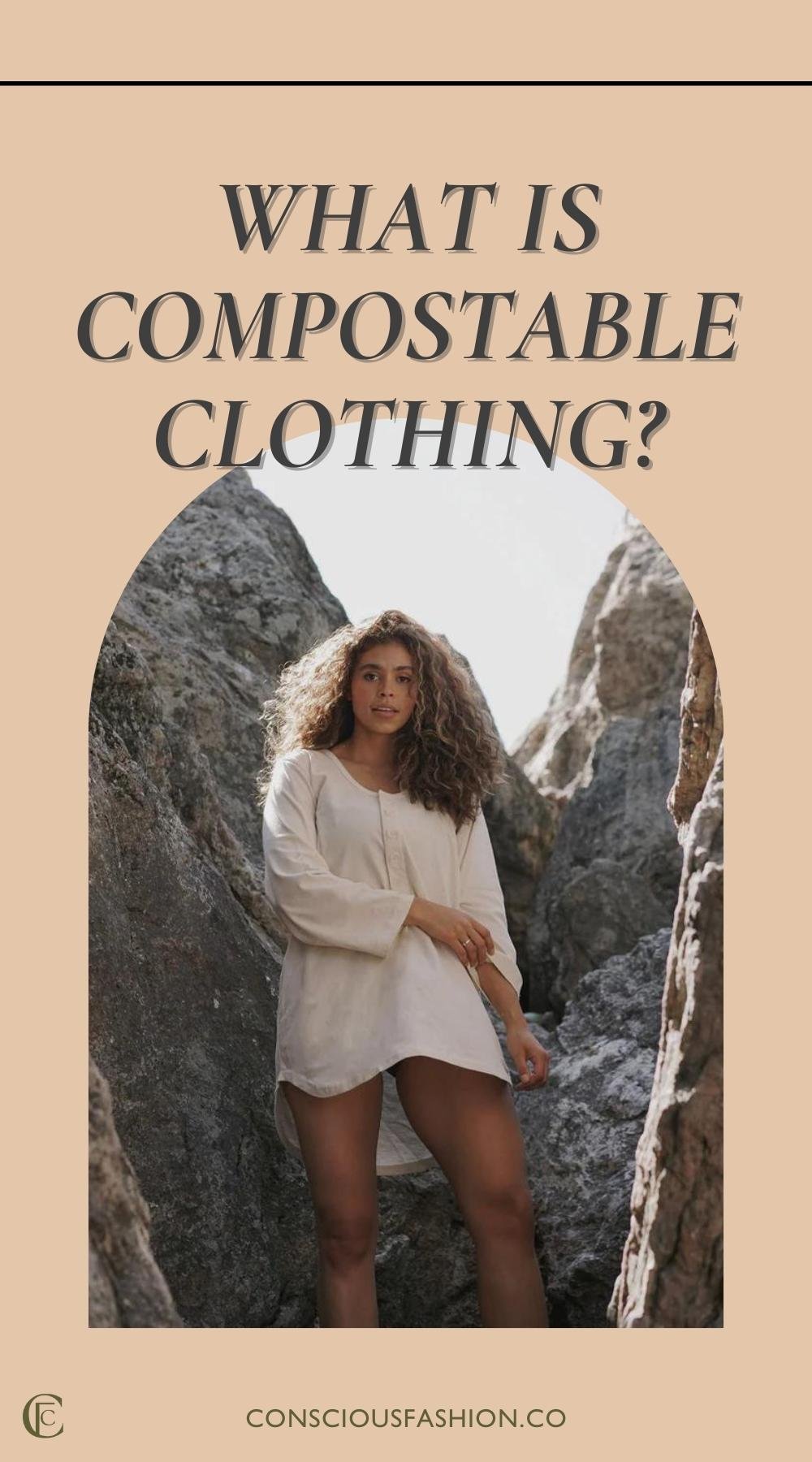What is Compostable Clothing? Plus 5 Brands Championing Soil-To-Soil Circularity
By Stella Hertantyo
What if you could compost your clothes with your food scraps? What if your t-shirt could be food for the soil?
Learn what makes a garment compostable (and how it's different from "biodegradable") plus discover brands crafting compostable clothing.
As Céline Semaan, founder of Slow Factory, told i-D, “Circularity is the idea that everything you make returns to Earth as either food or poison.”
When it comes to the fast fashion industry, the majority of clothes are made of materials that pollute our soil and poison waterways, which inevitably harms the communities that interact with these natural ecosystems.
So how do we ensure that the clothes we make act as food for the soil instead of poison? Many of us may already know that composting our organic kitchen waste creates nutrient-rich soil. Now, there are a few brands who are exploring how we can add fully compostable clothing to this mix.
This is called “soil-to-soil circularity”. Some regard compostable clothing as the only truly circular solution out there. “Nothing less is circular. There are brands that claim their plastic clothes are ‘circular’, but you can't put the plastic clothes back into the Earth's petroleum stores at the end of its life,” says Sarah Danu, Founder of Danu Organic.
Not only is compostable clothing good for the soil, for reducing waste and pollution, and for keeping toxic chemicals off our skin, but it also reduces the health risks faced by farm workers and garment workers who are exposed to toxic pesticides, chemicals, and dyes while producing our clothing.
What Is the Difference Between “Biodegradable” and “Compostable” Clothing?
While these terms are sometimes used interchangeably, it is important to note that there is a difference between the two. And this difference is important to understand as we navigate through greenwashing.
All compostable material is biodegradable, but not all biodegradable material is compostable.
“A biodegradable material refers to specific properties, where the material has a chemical structure that enables it to be broken down by micro-organisms into carbon dioxide and biomass. The time this takes and the ability of a material to break down will be affected by the environment it is present in, the temperature, humidity, and length of time,” says the Textile Exchange team.
“Whereas, the term ‘compostable’ refers to materials composed of organic matter which can break down in less than 12 weeks and are a positive contributor to soil quality,” the Textile Exchange team explains.
The key difference has to do with the required time for material breakdown to occur. “Compostable materials break down in a specific time frame, whereas biodegradable materials can take much longer,” adds the team.
Biodegradation is a natural process and almost everything biodegrades eventually.
But some materials — like plastic — take hundreds of years, while others — like organic kitchen waste — may only take a few weeks. When an item is labeled “biodegradable” it suggests that it biodegrades relatively quickly, but there is no set time frame for breakdown to occur.
“As compostable products can break down into their natural elements, they leave no visible, distinguishable, or toxic residue behind and will not cause any harm to the environment. The resulting ‘humus’ is rich in nutrients and is useful for our planet. It can be used as a soil conditioner, fertilizer, and natural pesticide,” explains a blog post by compostable underwear brand, Kent.
Non-compostable materials include polyester, acrylic, polyurethane, elastane, and nylon. These materials are partly derived from coal and petroleum and can stay in a landfill for hundreds of years.
On the other hand, compostable clothing adds to the soil. Compostable clothing is made from 100% compostable materials, which usually means plastic-free clothing made from organic natural fibers, and is also free from toxic dyes, finishes, and chemicals.
What Elements Make Natural Fiber Clothing Non-Compostable?
Just because a garment is made from natural fibers, doesn’t automatically mean it is compostable.
When figuring out if a natural fiber garment — made from fibers such as cotton, hemp, or linen — is fully compostable, here are a few things to keep in mind:
Organic natural fibers: Compostable clothing should be made from organic natural fibers. If the natural fibers used in the garment are not organic, then it means that they may have been grown using harmful pesticides and chemicals that will seep into the soil when the garment comes to its end of life.
Material blends: If a natural compostable fiber is blended with a synthetic fiber — such as polyester, nylon, or elastane — it is no longer fully compostable, even if the amount of non-compostable fiber is minimal.
Synthetic trimmings: Even clothing made from organic, natural fibers may have synthetic, fossil-fuel-derived elements, such as buttons, zippers, sequins, thread, elastic, or fusible interfacing. These need to be removed before composting.
Dyes: How a garment is dyed and finished also affects composability. Today most fabrics are colored with petroleum-derived synthetic dyes that pollute natural ecosystems and pose health risks.
Chemical finishes: Many fabrics are coated with chemical treatments that provide stain-, water-, fire-, or wrinkle-resistance. These often contain hazardous chemicals that leak into the environment.
And when it comes to composability, we need to not only consider what the garment is made from, but also how to properly dispose of it when we can no longer wear it.
How Do We Responsibly Compost Clothing?
When it comes to compostable clothing items, some are home-compostable and others require an industrial composting facility. This is because most home-composting setups don't get hot enough for the materials to break down at the optimal speed. And if sent to the landfill, they most likely won’t get enough water or air to decompose properly.
Many of the brands mentioned below have instructions on their website for how to compost your clothing when you can no longer wear it. But, if you are unsure, just ask. Reaching out to a brand is the best way to figure out how to best compost your clothing.
Here is a selection of brands championing soil-to-soil circularity with their compostable clothing.
Transparency note: this guide includes affiliate links, which means we earn a small commission if you choose to shop through these links. As always, brands meet high standards for sustainability and are brands that we love, and that we think you'll love too.
1) Sustain
As can be seen in their Colorgrown Cotton Tee and kidswear, every element of Sustain’s compostable clothing is petroleum-free — down to the thread.
At every step — from the growing to the processing into fabric and thread — their cotton and linen are free of pesticides, harmful chlorine bleaches, and other toxic chemicals. Their natural dyes are made from ingredients including pomegranate peels, madder roots, indigo leaves, and rhubarb.
Sustain also has an undyed and color-grown cotton line for those with sensitive skin or who love the look and feel of natural cotton.
Conscious elements: Natural and organic fibers used in fabrics, threads, and labels, plant-based dyes and undyed options, Ayurvedic dyeing techniques
Investment: $$
2) PECKD
Based in Gurugram, India, PECKD was started for people who don’t want to have to choose between style and the planet, as proven by their Kaeda and Fan tops. PECKD designs compostable clothing using only natural fabrics — such as vegan moss and compostable silk — and natural dyes. Even their buttons are made from nut pulp and dehydrated vegetables.
This extends to their packaging and product tags which are made from biodegradable seed paper. Bury the seed paper in moist soil, to have a new plant growing from it in no time!
Conscious elements: Organic, natural fabrics, plastic-free, natural dyes
Investment: $$
3) KENT
With its ethical and transparent supply chain, KENT is an underwear brand that isn’t keeping any secrets.
KENT is encouraging us all to “plant our pants” with their range of compostable underwear. Their 100% plant-based (and plantable) briefs are free from plastics, chemicals, and synthetic dyes and softeners and will return to the soil in 90 days.
Their items are both home-compostable and compostable in industrial settings. To make the process even more seamless, you can join the KENT Compost Club — the fashion industry’s first compost take-back program aiming to reduce landfill waste. KENT has partnered with a regenerative, organic farm in Southern California to divert waste from landfill and repurpose briefs in compost to become nutrient-rich soil.
Conscious elements: GOTS-certified organic Pima cotton, hypoallergenic, free from petrochemicals, pesticides, and microplastics, natural dyes, bio-based elastics, vegan, compost take-back program
Investment: $$
4) California Cloth Foundry
California Cloth Foundry creates healthy wardrobes in collaboration with nature. And they stay true to this ethos with their commitment to creating compostable clothing, made with botanical ingredients, that's free from petroleum-based fibers, treatments, and dyes.
As can be seen with their all-natural loungewear — such as their Cleaner Cotton Tank Dress and Botanical Hoodie — this brand uses natural materials such as regenerative hemp, climate beneficial wool, Cleaner Cotton™, Texas Organic, and Lenzing Modal®
Instead of only focusing on reducing their negative impact, California Cloth Foundry is dedicated to leaving a positive impact, through their focus on regenerative fashion.
“Our goal is 100% regenerative. This means creating a system that improves upon itself, and creating agricultural by-products that enrich the soil every season, rather than staying the same or sustaining itself,” says founder, Lydia Wendt, on an episode of the Conscious Style Podcast.
Conscious elements: Organic fabrics including hemp, climate beneficial wool, Cleaner Cotton™, Texas Organic, and Lenzing Modal®, botanical ingredients, free from petroleum-based fibers, treatments, and dyes, natural mordants.
Investment: $$-$$$
5) Harvest & Mill
If you're looking to invest in a few staples for a non-toxic wardrobe, Harvest & Mill creates organic basics, loungewear, and socks grown and sewn in the United States from field to closet. Their focus is on creating localized supply chains that center on ethical, sustainable, and transparent practices.
Harvest & Mill is passionate about reviving ancient practices in the modern world, such as their experimentation with clay dyeing. Most of their compostable clothing is made using natural colors and organic heirloom cottons that are dye-free and bleach-free.
Each garment you browse — including their Organic Heirloom Crew Tee and American-Grown Indigo Shorts — comes with information about the fabric, origins, and environmental impact of the item so you can make a truly informed choice.
Conscious elements: Organic USA-grown cotton, most clothing is dye-free or naturally colored, carbon neutral, vegan, non-toxic, localized supply chain, zero waste design
Investment: $$
(Brand on break)
Bonus: Danu Organic
In a rich palette of dreamy, earthy hues, Danu Organic creates slow fashion to accompany a slow life. Their offering of timeless wardrobe basics — including their Palma Pants and Equatorial Wrap — are made from organic fabrics that are undyed or naturally dyed.
Their attention to detail — from using compostable corozo nut buttons and organic thread, and using heirloom plants to safeguard biodiversity, to their Infinite Return Program — reflects a deep commitment to creating compostable clothing that is healthy for our bodies and the earth. And the understanding that businesses should be responsible for the products they create.
For each garment you browse, you can read about the ingredients used to make it, the journey the item has been on from farm to closet, and care and end-of-life instructions.
Conscious elements: Organic cotton or linen, GOTS-certified organic thread, organic cotton natural rubber elastic, natural dyes, compostable corozo nut buttons, Infinite Return Program
Investment: $$$
About the Author:
Stella Hertantyo is based in Cape Town, South Africa, and is currently completing her PGDip in Sustainable Development to accompany her undergraduate in Multimedia journalism. She is a slow-living enthusiast and a lover of low-impact fashion.
She is passionate about encouraging an approach to sustainability that is inclusive, accessible, and fun as we try to figure out how to create a more sustainable and just world, together.
When Stella is not in front of her laptop doing uni work, you'll probably find her reading, writing, illustrating, or baking/cooking. A dip in the ocean, or a walk in the mountains, are the two things that bring her the most peace.
PIN IT & SAVE IT
Cover Image credit: Ozara










